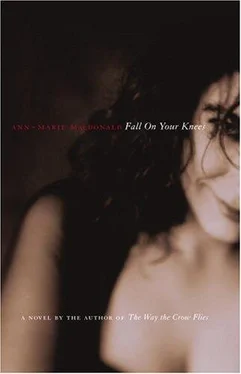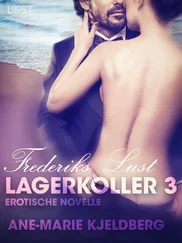Adelaide pulls up in front of MacIsaac’s Drugs and Confectionery. Mr MacIsaac is closing up for the evening, she catches him on the way out.
“Mr MacIsaac, I’m Addy Taylor from the Pier.”
“Hello, Mrs Taylor.”
He extends his old red hand and she shakes it. His eyes are clear these days but still kind.
Adelaide reaches deep into her wicker basket. “Have a swig of this, Mister Mac.”
She uncorks a brown bottle. MacIsaac shakes his head, being two years on the wagon.
“It’s the best ginger beer you ever tasted,” says Adelaide.
He smiles. Takes it and drinks. It is. Sweet up front, then sears the back of your throat till your earwax tinkles.
“What do you call it?”
“‘Clarisse’s Island Brew.’”
“Are you from the islands, Mrs Taylor?”
Adelaide laughs, “I’m from Halifax for a hundred and fifty-six years, mister, where’re you from?”
“From here for eighty or ninety years, and as far as I know before that it was the Isle of Skye, the Isle of Man and, let’s see now, the Isle of Wight.”
“Your people had a taste for islands.”
“You’d think we’d’ve learned by now, eh?”
He wheezes and she laughs. He orders three cases for the store to see how it goes.
Frances is risen from the baby carriage now that Adelaide has ridden off on her bike. “Like a witch on her broom,” thinks Frances with a shudder. She has sent Lily home, claiming the need to “commune with nature”.
Part of Frances’s new health regime is moderate exercise. It’s hard to know what to believe about pregnancy when, in movies, miscarriages are a narrative convenience as close as the nearest flight of stairs, while in books like Great Pioneer Women the broads all fight bears and harvest corn right up to their accouchement. Frances has decided upon the happy medium of regular oceanside walks. Romantic heroines are always being ordered to take the sea air. Unless they are tubercular, in which case they are banished to the land where the blood oranges grow. Frances hasn’t noticed any tubercular tendencies in herself. In fact, with the conviction of her pregnancy her self-image has evolved into that of a much larger woman. Slow and curvaceous, with a bosom instead of a chest.
Trixie has come along for the walk. Something about her attentive behaviour, as well as the trotting gait necessitated by her missing paw, makes Trixie seem more canine than feline. And she is in the habit of casting quick glances up at Frances, checking in the way a dog does. They arrive at the edge of the cliff. Trixie follows as Frances traverses the stony slope, eschewing her former habit of skidding headlong on her hands and heels. At the bottom, Frances pauses and takes a deep salty breath.
She turns north and begins to stroll as though through warm water, or as though rhythmically across the endless wet sand of a beach she has never visited but would know instinctively how to tread. This kind of walking goes with her new hips, which have become what is commonly described as “child-bearing”.
They walk on. This is the best of the summer. Not yet eight in the evening, the sun has brought out the green of the ocean and bathed the sky in a soothing balm of fire. Days like this are so precious. Frances stops and looks out at the sea, which trembles at the caress of the sun. Mumma feels near … as though she had never gone away. Frances is feeling a familiar yet unnameably old feeling. One she hadn’t known was ever hers to forget. Happiness. Unlike her imaginary new body, this feeling is genuine.
Trixie looks up and sees Teresa standing on the ridge above. Backlit, Teresa is magnificently darker and brighter than ever. Seen from far below like this, her great height is higher still. In this light, at that height, everything becomes a precise charcoal line. Teresa’s body is a bold vertical stroke. Bisecting her middle is a horizontal line half as long as she is tall. Against the red-gold blaze of evening. Frances looks up and experiences an arrow through her heart at the crucivision. The arrow is love, its pain spreads outward and the pain is faith, the source that launched the arrow was sorrow. “Teresa,” thinks Frances, and her lips move around the name as she stretches her arms up and holds them out to the woman standing far above.
The horizontal line across Teresa revolves like the needle of a compass till it disappears into the vertical stroke of her body, and the next instant a shot rings out. Frances jolts through the air and onto her back against the gravel shore.
No one knows just how much Hector understands, not even Teresa. She long ago ceased to look for signs of dear Hector, it being the only way she could come to terms with his loss. And besides, the doctor said Hector was brain-damaged into a cheerful vegetable. Although his only memories from before the accident are smell feelings, Hector has learned to understand English again the way a child learns, in nouns and verbs and concepts. He could learn to read again too if someone thought of teaching him. Unlike a child, however, he will never be able to speak the words himself. What’s left to him is the speech of dogs.
“Hey, hey, Hector, what’s the matter b’y?”
Old Wilf Beel has caught up to Hector’s wheelchair and pulled him to the side of the road. Hector makes his sounds and paws at Wilf’s jacket, his mouth foaming with panic, and Wilf asks, “Are you lost, Hector?”
Hector groans in frustration, then erupts into rage when Wilf actually points the wheelchair back homeward and starts pushing.
“Whoa, whoa, whoa, b’y —” says Wilf. But Hector flails at the armrests and wrenches his head around in an effort to see Wilf.
“Did you want to go visit Leo and Adelaide, is that it, Heck?”
And Hector can only bob his head and beam joylessly to get the message across loud and clear, YES! JESUS CHRIST ALMIGHTY, YES!
“Oh, well, I don’t mind taking you there.”
And Wilf turns the chair around again and pushes Hector along, if more slowly than Hector was travelling under his own steam, at least in a much straighter line.
“Where’s Teresa at, eh Hector?”
Hector ignores the question but Wilf doesn’t notice.
Teresa is in a state of disbelief. Minutes ago she was gliding along the Shore Road on the bike, having got the hang of it in the course of eight or so miles. She caught sight of the figure on the beach below because of the bright colours it wore, kindled by the full light of the setting sun. The dress looked familiar. Teresa laid down the bike and walked to the edge of the cliff for a better look. The sight of the dress awoke an emotion detached from context. Sympathy — and… pity. Yes. She felt sorry for her. The woman who answered the door in that dress, oh, long ago, a blonde child at her feet, she was married to — it’s Materia Piper’s dress. A strip of goose-flesh streaked down Teresa’s left arm at the recognition of the dress and of the wearer, whose aimless rhythm and bearing also said Materia. There was a small black dog down there too, trotting at the woman’s heels. Did the Pipers have a dog back then, Teresa tried to recall as she slowly parallelled them along the cliff, the rifle threaded through her folded arms.
That poor woman…. Teresa always wished she had done some nice little thing for Materia, since she was the only person Teresa had ever met who truly seemed worse off than herself.
Teresa doesn’t believe in ghosts, nevertheless she expected any moment the figure to shimmer and disappear into ocean light.
“Perhaps it is a sign,” she thought, “asking me not to harm her daughter.”
And Teresa took pity on the woman who was not strong enough to live, but was strong enough to pierce through death to protect her child.
Читать дальше












